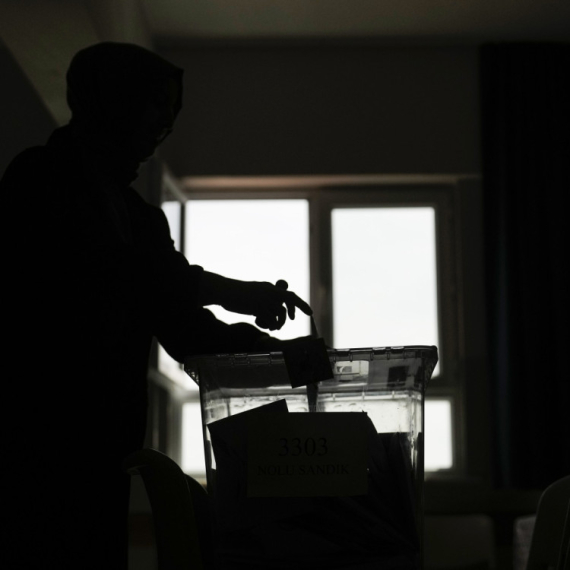Journalist and author from Kosovo promotes book in Belgrade
Veton Surroi's novel "Billionaire," published by <a href="http://samizdatb92.rs/" class="text-link" target= "_blank">Samizdat B92</a>, was promoted in Belgrade's Dom Omladine venue on Monday.
Wednesday, 10.06.2015.
10:07

Journalist and author from Kosovo promotes book in Belgrade
Surroi - who has not been in Belgrade for the past 17 years, having previously spent much of his life here - attended the promotion, along with historian Latinka Perovic, journalist, publicist, and literary critic Teofil Pancic, and playwright Borka Pavicevic, who all spoke about the book during the event moderated by Misa Stojiljkovic.Surroi addressed the packed audience in Serbian while other participants' statements were translated to Albanian, Tanjug reported.
Stojiljkovic addressed the gathering to say it was organized as part of an ongoing festival presenting "Kosovo's cultural scene to Belgrade - as a cultural contribution to general aspirations to establish "permanent peace and normalization of relations Serbia and Kosovo."
Surroi welcomed the audience and said he was very happy that the promotion of his novel was held on the birthday of his father, who would have been 86 years old, and who came to Belgrade as a young man to study law, and after graduating worked as a journalist and diplomat until he was killed in a car accident in Spain.
"At the time my father arrived in Belgrade, Siptar (Albanian) was a profession because that is what lumberjacks, porters, those who did hard manual work were called, but when he returned to Pristina, he decided to get involved in the founding of a university and at its opening addressed the audience in Albanian with the message that this language will not be spoken only by those who work the hardest jobs, but by future scientists, writers, artists, professors, " said he.
Latinka Perovic said she was honored and very pleased to have the opportunity to present an Albanian writer from Kosovo, but noted she was there "also for other reasons - because she has had a consistent approach to the Albanian issue and advocated in favor for their culture and language in the former Yugoslavia."
According to her, the book is not only literary but also a social enterprise, and particularly commended the very good translation and the willingness of Samizdat B92 "to show its engagement in practice" by publishing it.
Perovic then noted that the 54-year-old author was born in Pristina to spend a significant part of his life in Belgrade before going back to become "personally engaged socially and politically, launching the influential newspaper Koha Ditore and a television station."
Speaking about the book, Perovic described it as "condensed, modern, written without passion, with a sense of proportion also for those who were the victims," adding that Surroi "writes about people who have felt the terror of war, the violence in Kosovo and found themselves unexpectedly in transition. "
Perovic found it important that the writer was "not vindictive" and was "building his fiction on realistic foundations," while "some of the characters resemble concrete figures who lived there and were detained until 2000."
Perovic also singled out the lyrical side that refers to the fate of a long-term prisoner in the former Yugoslavia who, as he is finally released, decides to leave for the U.S., where he found the freedom that is multidimensional.
For Perovic, the book is not only a testimony to the creation of a new culture that has grown right next to us, but a document about times traumatic for all of us during the 1990s when there were oases of resistance in which dialogue with members of other nations was not interrupted.
"From culture starts the spirit of mutual understanding and rejection of stereotypes imposed by a policy that is still enraged, and it is up to us to accept the reality," said Perovic.
Borka Pavicevic admitted that Surroi's book left a strong impression on her and found that the man who wrote it "must be very good to be able to write with so much compassion about the peopled denied the right to work only because they belong to a denounced people."
She said this absence of work opportunities was the essence of the drama of Surroi's heroes who can only to roam the streets or sit in cafes without a purpose, knowing that they are unable to change the situation in the community where they live.
Pavicevic considers the book not to be a political novel, but a story about transition and its tragic consequences.
Teofil Pancic insisted that the book is an authentic novel without influences of publicism and belongs among the best works of modern Albanian literature that is mostly unknown to us. Pancic considers this a great failing, because regardless of the fact it was written in another language, "it refers to us and our environment."
He then noted that the novel brings with it "an ocean of topics about which we know nothing, that concern the Serbian society because Surroi looks at it from another angle, unknown to us."
Surroi also spoke at the gathering to say the promotion was proof that things were changing for the better, and that conditions for the establishment of a genuine dialogue are being created. He described the novel as "a sort of path to self-liberation, to finding his own voice but also to setting himself free of the subjects which he had to deal with."




































Komentari 0